Fleurs du Mal Magazine


Or see the index
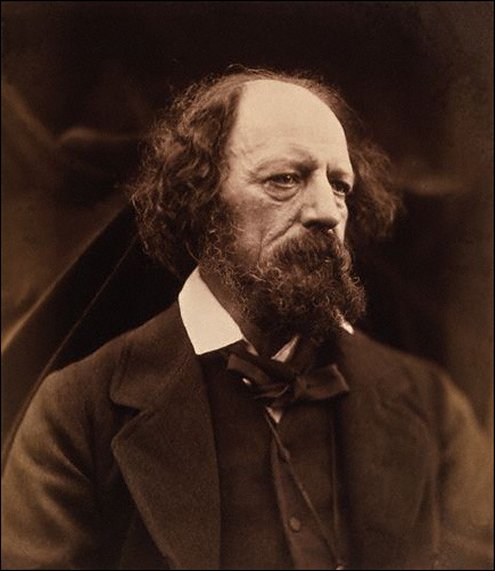
Alfred Lord Tennyson
(1809-1892)
A d e l i n e
1
Mystery of mysteries,
Faintly smiling Adeline,
Scarce of earth nor all divine,
Nor unhappy, nor at rest,
But beyond expression fair
With thy floating flaxen hair;
Thy rose-lips and full blue eyes
Take the heart from out my breast.
Wherefore those dim looks of thine,
Shadowy, dreaming Adeline?
2
Whence that aery bloom of thine,
Like a lily which the sun
Looks thro’ in his sad decline,
And a rose-bush leans upon,
Thou that faintly smilest still,
As a Naiad in a well,
Looking at the set of day,
Or a phantom two hours old
Of a maiden passed away,
Ere the placid lips be cold?
Wherefore those faint smiles of thine,
Spiritual Adeline?
3
What hope or fear or joy is thine?
Who talketh with thee, Adeline?
For sure thou art not all alone:
Do beating hearts of salient springs
Keep measure with thine own?
Hast thou heard the butterflies
What they say betwixt their wings?
Or in stillest evenings
With what voice the violet woos
To his heart the silver dews?
Or when little airs arise,
How the merry bluebell rings
To the mosses underneath?
Hast thou look’d upon the breath
Of the lilies at sunrise?
Wherefore that faint smile of thine,
Shadowy, dreaming Adeline?
4
Some honey-converse feeds thy mind,
Some spirit of a crimson rose
In love with thee forgets to close
His curtains, wasting odorous sighs
All night long on darkness blind.
What aileth thee? whom waitest thou
With thy soften’d, shadow’d brow,
And those dew-lit eyes of thine,
Thou faint smiler, Adeline?
5
Lovest thou the doleful wind
When thou gazest at the skies?
Doth the low-tongued Orient
Wander from the side of the morn,
Dripping with Sabsean spice
On thy pillow, lowly bent
With melodious airs lovelorn,
Breathing Light against thy face,
While his locks a-dropping twined
Round thy neck in subtle ring
Make a ‘carcanet of rays’,
And ye talk together still,
In the language wherewith Spring
Letters cowslips on the hill?
Hence that look and smile of thine,
Spiritual Adeline.
![]()
Alfred Lord Tennyson poetry
kempis poetry magazine
More in: Tennyson, Alfred Lord
.jpg)

Monica Richter: Gesichte im Wald -5
kempis poetry magazine
More in: Monica Richter, Richter, Monica
.jpg)
Gerard Manley Hopkins
(1844-1889)
Inversnaid
This darksome burn, horseback brown,
His rollrock highroad roaring down,
In coop and in comb the fleece of his foam
Flutes and low to the lake falls home.
A windpuff-bonnet of fawn-froth
Turns and twindles over the broth
Of a pool so pitchblack, fell-frowning,
It rounds and rounds Despair to drowning.
Degged with dew, dappled with dew,
Are the groins of the braes that the brook treads through,
Wiry heathpacks, flitches of fern,
And the beadbonny ash that sits over the burn.
What would the world be, once bereft
Of wet and wildness? Let them be left,
O let them be left, wildness and wet;
Long live the weeds and the wilderness yet.
I wake and feel the fell of dark
I wake and feel the fell of dark, not day,
What hours, O what black hours we have spent
This night! what sights you, heart, saw; ways you went!
And more must, in yet longer light’s delay.
With witness I speak this. But where I say
Hours I mean years, mean life. And my lament
Is cries countless, cries like dead letters sent
To dearest him that lives alas! away.
I am gall, I am heartburn. God’s most deep decree
Bitter would have me taste: my taste was me;
Bones built in me, flesh filled, blood brimmed the curse.
Selfyeast of spirit a dull dough sours. I see
The lost are like this, and their scourge to be
As I am mine, their sweating selves; but worse.
![]()
Gerard Manley Hopkins poetry
kempis poetry magazine
More in: Hopkins, Gerard Manley
.jpg)
Entschlüsse
Franz Kafka (1883-1924)
Aus einem elenden Zustand sich zu erheben, muß selbst mit gewollter Energie leicht sein. Ich reiße mich vom Sessel los, umlaufe den Tisch, mache Kopf und Hals beweglich, bringe Feuer in die Augen, spanne die Muskeln um sie herum. Arbeite jedem Gefühl entgegen, begrüße A. stürmisch, wenn er jetzt kommen wird, dulde B. freundlich in meinem Zimmer, ziehe bei C. alles, was gesagt wird, trotz Schmerz und Mühe mit langen Zügen in mich hinein. Aber selbst wenn es so geht, wird mit jedem Fehler, der nicht ausbleiben kann, das Ganze, das Leichte und das Schwere, stocken, und ich werde mich im Kreise zurückdrehen müssen. Deshalb bleibt doch der beste Rat, alles hinzunehmen, als schwere Masse sich verhalten und fühle man sich selbst fortgeblasen, keinen unnötigen Schritt sich ablocken lassen, den anderen mit Tierblick anschaun, keine Reue fühlen, kurz, das, was vom Leben als Gespenst noch übrig ist, mit eigener Hand niederdrücken, d. h., die letzte grabmäßige Ruhe noch vermehren und nichts außer ihr mehr bestehen lassen.
Eine charakteristische Bewegung eines solchen Zustandes ist das Hinfahren des kleinen Fingers über die Augenbrauen.
.jpg)
Franz Kafka: Betrachtung 1913 – Für M.B.
fleursdumal.nl magazine
More in: Franz Kafka, Kafka, Franz, Kafka, Franz
.jpg)
Rainer Maria Rilke
(1875-1926)
Das Bett
LASS sie meinen, daß sich in privater
Wehmut löst, was einer dort bestritt.
Nirgend sonst als da ist ein Theater;
reiß den hohen Vorhang fort -: da tritt
vor den Chor der Nächte, der begann
ein unendlich breites Lied zu sagen,
jene Stunde auf, bei der sie lagen,
und zerreißt ihr Kleid und klagt sich an,
um der andern, um der Stunde willen,
die sich wehrt und wälzt im Hintergrunde;
denn sie konnte sie mit sich nicht stillen.
Aber da sie zu der fremden Stunde
sich gebeugt: da war auf ihr,
was sie am Geliebten einst gefunden,
nur so drohend und so groß verbunden
und entzogen wie in einem Tier.
Das Kind
UNWILLKÜRLICH sehn sie seinem Spiel
lange zu; zuweilen tritt das runde
seiende Gesicht aus dem Profil,
klar und ganz wie eine volle Stunde,
welche anhebt und zu Ende schlägt.
Doch die Andern zahlen nicht die Schläge,
trüb von Mühsal und vom Leben träge;
und sie merken gar nicht, wie es trägt -,
wie es alles trägt, auch dann, noch immer,
wenn es müde in dem kleinen Kleid
neben ihnen wie im Wartezimmer
sitzt und warten will auf seine Zeit.
![]()
Rainer Maria Rilke: 2 Gedichte
fleursdumal.nl magazine
More in: Archive Q-R, Rilke, Rainer Maria

Edward Thomas
(1878-1917)
The Other
The forest ended. Glad I was
To feel the light, and hear the hum
Of bees, and smell the drying grass
And the sweet mint, because I had come
To an end of forest, and because
Here was both road and inn, the sum
Of what’s not forest. But ’twas here
They asked me if I did not pass
Yesterday this way. ‘Not you? Queer.’
‘Who then? and slept here?’ I felt fear.
I learnt his road and, ere they were
Sure I was I, left the dark wood
Behind, kestrel and woodpecker,
The inn in the sun, the happy mood
When first I tasted sunlight there.
I travelled fast, in hopes I should
Outrun that other. What to do
When caught, I planned not. I pursued
To prove the likeness, and, if true,
To watch until myself I knew.
I tried the inns that evening
Of a long gabled high-street grey,
Of courts and outskirts, travelling
And eager but a weary way,
In vain. He was not there. Nothing
Told me that ever till that day
Had one like me entered those doors,
Save once. That time I dared: ‘You may
Recall’ — but never-foamless shores
Make better friends than those dull boors.
Many and many a day like this
Aimed at the unseen moving goal
And nothing found but remedies
For all desire. These made not whole;
They sowed a new desire, a kiss
Desire’s self beyond control,
Desire of desire. And yet
Life stayed on within my soul.
One night in sheltering from the wet
I quite forgot I could forget.
A customer, then the landlady
Stared at me. With a kind of smile
They hesitated awkwardly:
Their silence gave me time for guile.
Had anyone called there like me,
I asked. It was quite plain the wile
Succeeded. For they poured out all.
And that was naught. Less than a mile
Beyond the inn, I could recall
He was like me in general.
He had pleased them, but I less.
I was more eager than before
To find him out and to confess,
To bore him and to let him bore.
I could not wait: children might guess
I had a purpose, something more
That made an answer indiscreet.
One girl’s caution made me sore,
Too indignant even to greet
That other had we chanced to meet.
I sought then in solitude.
The wind had fallen with the night; as still
The roads lay as the ploughland rude,
Dark and naked, on the hill.
Had there been ever any feud
‘Twixt earth and sky, a mighty will
Closed it: the crocketed dark trees,
A dark house, dark impossible
Cloud-towers, one star, one lamp, one peace
Held on an everlasting lease:
And all was earth’s, or all was sky’s;
No difference endured between
The two. A dog barked on a hidden rise;
A marshbird whistled high unseen;
The latest waking blackbird’s cries
Perished upon the silence keen.
The last light filled a narrow firth
Among the clouds. I stood serene,
And with a solemn quiet mirth,
An old inhabitant of earth.
Once the name I gave to hours
Like this was melancholy, when
It was not happiness and powers
Coming like exiles home again,
And weaknesses quitting their bowers,
Smiled and enjoyed, far off from men,
Moments of everlastingness.
And fortunate my search was then
While what I sought, nevertheless,
That I was seeking, I did not guess.
That time was brief: once more at inn
And upon road I sought my man
Till once amid a tap-room’s din
Loudly he asked for me, began
To speak, as if it had been a sin,
Of how I thought and dreamed and ran
After him thus, day after day:
He lived as one under a ban
For this: what had I got to say?
I said nothing. I slipped away.
And now I dare not follow after
Too close. I try to keep in sight,
Dreading his frown and worse his laughter.
I steal out of the wood to light;
I see the swift shoot from the rafter
By the inn door: ere I alight
I wait and hear the starlings wheeze
And nibble like ducks: I wait his flight.
He goes: I follow: no release
Until he ceases. Then I also shall cease.
Edward Thomas: The Other

kempis poetry magazine
More in: Thomas, Edward
.jpg)
Charles Baudelaire
(1821-1867)
3 Poèmes
Une charogne
Rappelez-vous l’objet que nous vîmes, mon âme,
Ce beau matin d’été si doux:
Au détour d’un sentier une charogne infâme
Sur un lit semé de cailloux,
Les jambes en l’air, comme une femme lubrique,
Brûlante et suant les poisons,
Ouvrait d’une façon nonchalante et cynique
Son ventre plein d’exhalaisons.
Le soleil rayonnait sur cette pourriture,
Comme afin de la cuire à point,
Et de rendre au centuple à la grande Nature
Tout ce qu’ensemble elle avait joint.
Et le ciel regardait la carcasse superbe
Comme une fleur s’épanouir;
La puanteur était si forte que sur l’herbe
Vous crûtes vous évanouir.
Les mouches bourdonnaient sur ce ventre putride,
D’où sortaient de noirs bataillons
De larves qui coulaient comme un épais liquide
Le long de ces vivants haillons.
Tout cela descendait, montait comme une vague,
Où s’élançait en pétillant;
On eût dit que le corps, enflé d’un souffle vague,
Vivait en se multipliant.
Et ce monde rendait une étrange musique
Comme l’eau courante et le vent,
Ou le grain qu’un vanneur d’un mouvement rythmique
Agite et tourne dans son van.
Les formes s’effaçaient et n’étaient plus qu’un rêve,
Une ébauche lente à venir
Sur la toile oubliée, et que l’artiste achève
Seulement par le souvenir.
Derrière les rochers une chienne inquiète
Nous regardait d’un oeil fâché,
Epiant le moment de reprendre au squelette
Le morceau qu’elle avait lâché.
–Et pourtant vous serez semblable à cette ordure,
A cette horrible infection,
Etoile de mes yeux, soleil de ma nature,
Vous, mon ange et ma passion!
Oui! telle vous serez, ô la reine des grâces,
Après les derniers sacrements,
Quand vous irez sous l’herbe et les floraisons grasses,
Moisir parmi les ossements.
Alors, ô ma beauté, dites à la vermine
Qui vous mangera de baisers,
Que j’ai gardé la forme et l’essence divine
De mes amours décomposés!
Sepulture d’un poète maudit
Si par une nuit lourde et sombre
Un bon chrétien, par charité,
Derrière quelque vieux décombre
Enterre votre corps vanté,
A l’heure où les chastes étoiles
Ferment leurs yeux appesantis,
L’araignée y fera ses toiles,
Et la vipère ses petits;
Vous entendrez toute l’année
Sur votre tête condamnée
Les cris lamentables des loups
Et des sorcières faméliques,
Les ébats des vieillards lubriques
Et les complots des noirs filous.
Le mort joyeux
Dans une terre grasse et pleine d’escargots
Je veux creuser moi-même une fosse profonde,
Où je puisse à loisir étaler mes vieux os
Et dormir dans l’oubli comme un requin dans l’onde.
Je hais les testaments et je hais les tombeaux;
Plutôt que d’implorer une larme du monde,
Vivant, j’aimerais mieux inviter les corbeaux
A saigner tous les bouts de ma carcasse immonde.
O vers! noirs compagnons sans oreille et sans yeux,
Voyez venir à vous un mort libre et joyeux;
Philosophes viveurs, fils de la pourriture,
A travers ma ruine allez donc sans remords,
Et dites-moi s’il est encor quelque torture
Pour ce vieux corps sans âme et mort parmi les morts?
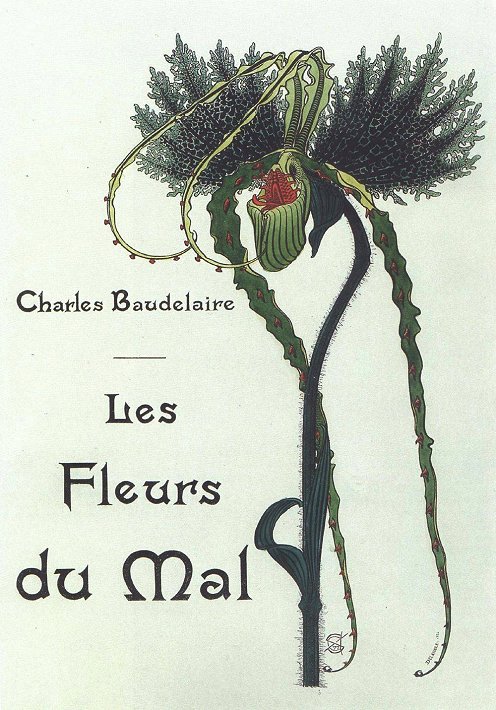
KEMP=MAG – kempis poetry magazine – magazine for art & literature
More in: Archive A-B, Baudelaire, Baudelaire, Charles
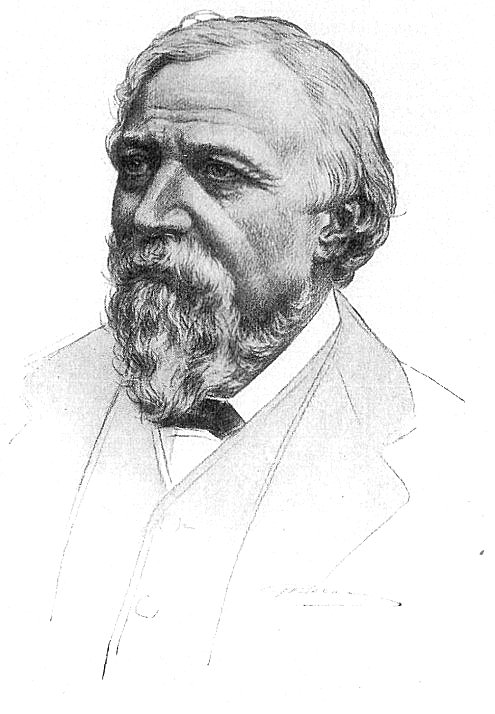
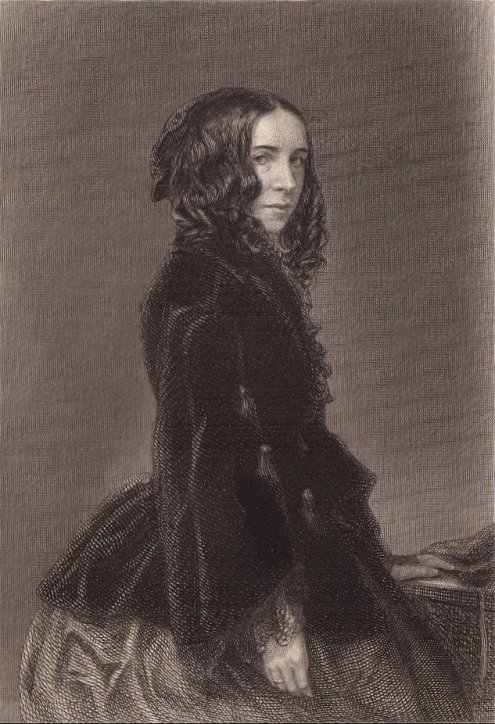
Gallery of Poets’ Portraits:
Robert Browning (1812-1889) &
Elizabeth Barrett Browning (1806-1861)
.jpg)
fleursdumal.nl magazine – magazine for art & literature
More in: Barrett Browning, Elizabeth, Poets' Portraits
.jpg)
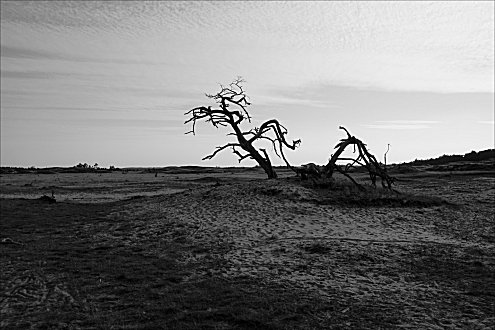
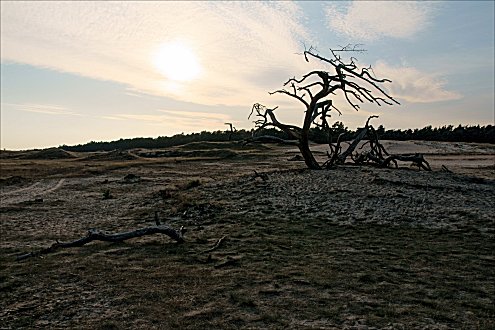
A. C. W. S t a r i n g
(1767-1840)
Een Gelders lied
Ik ben uit Gelders bloed!
Geen vleitoon klinkt mij zoet;
Mijn volksspraak, luttel rond,
Geeft nog de klank terug,
Uit onzer vaadren mond.
Bij de eiken, aan de top
Eens heuvels, wies ik op.
In heiden zonder baan,
Leerde ik, ter jacht geschort,
Mijn eerste treden gaan.
Mijn arm is ‘t wild geducht:
De reebok helpt geen vlucht,
Het zwijn geen scherpe tand,
Als, in mijn dreigend roer,
Een snelle dood ontbrandt.
Ik smaâ de lauwer niet,
Die ‘t koor des Vredes biedt,
Maar schat een andre meer!
De krans, door ‘t zwaard verdiend,
Is ook een krans der Eer!
En gesp ik ‘t harnas aan,
Ik volg geen vreemde daân;
Op Rossems heldenspoor,
Zweeft mij, in stralend licht,
Het beeld der zege voor.
Ik ben uit Gelders bloed!
Oprecht is mijn gemoed;
Aan eenvoud heb ik lust;
Met pracht en weeld komt zorg;
Genoegzaamheid baart rust.
(1837)
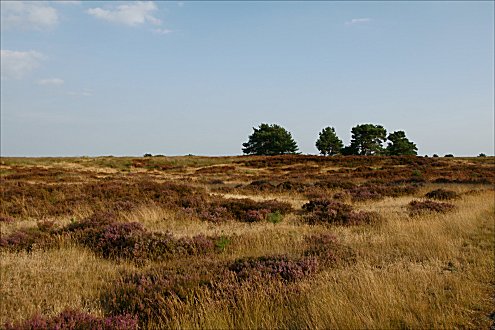
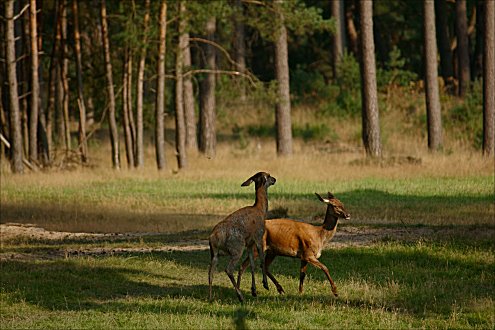
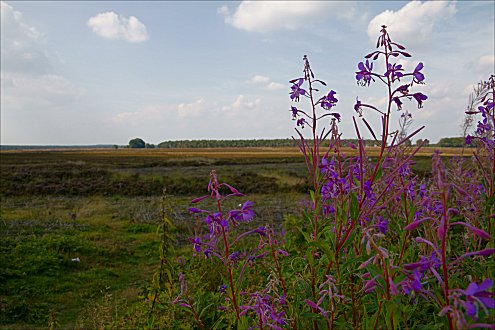
Hans Hermans Natuurdagboek: September 2009
De Hoge Veluwe
Gedicht: Een Gelders lied van A.C.W. Staring
kempis poetry magazine
© photos Hans Hermans
More in: Archive S-T, Hans Hermans Photos, MUSEUM OF NATURAL HISTORY - department of ravens & crows, birds of prey, riding a zebra, spring, summer, autumn, winter
.jpg)
Willem Kloos
(1859-1938)
Ik denk altoos aan U…
Ik denk altoos aan u, als aan die dromen,
Waarin een ganse lange, zalige nacht,
Een nooit gezien gelaat ons tegenlacht,
Zo onuitspreeklijk lief, dat bij het domen
Des bleke ochtend, nog de tranen stromen
Uit halfgelokene ogen, tot we ons zacht
En zwijgend heffen met de stille klacht,
Dat schone dromen niet weerrommekomen…
Want àlles ligt in eeuwige slaap bevangen,
In de eeuwige nacht, waarop geen morgen daagt –
En héél dit leven is een wondere, bange,
Ontzétbare droom, die eens de nacht weer vaagt –
Maar in die droom een droom, vol licht en zangen,
MIJN droom, zo zoet begroet, zo zacht beklaagd…

kempis poetry magazine
More in: Kloos, Willem
.jpg)

Monica Richter: Gesicht im Wald -4
kempis poetry magazine
More in: Monica Richter, Richter, Monica

Samuel Taylor Coleridge
(1772-1834)
L o v e
All thoughts, all passions, all delights,
Whatever stirs this mortal frame,
All are but ministers of Love,
And feed his sacred flame.
Oft in my waking dreams do I
Live o’er again that happy hour,
When midway on the mount I lay,
Beside the ruined tower.
The moonshine, stealing o’er the scene
Had blended with the lights of eve;
And she was there, my hope, my joy,
My own dear Genevieve!
She leant against the arm{‘e}d man,
The statue of the arm{‘e}d knight;
She stood and listened to my lay,
Amid the lingering light.
Few sorrows hath she of her own,
My hope! my joy! my Genevieve!
She loves me best, whene’er I sing
The songs that make her grieve.
I played a soft and doleful air,
I sang an old and moving story—
An old rude song, that suited well
That ruin wild and hoary.
She listened with a flitting blush,
With downcast eyes and modest grace;
For well she knew, I could not choose
But gaze upon her face.
I told her of the Knight that wore
Upon his shield a burning brand;
And that for ten long years he wooed
The Lady of the Land.
I told her how he pined: and ah!
The deep, the low, the pleading tone
With which I sang another’s love,
Interpreted my own.
She listened with a flitting blush,
With downcast eyes, and modest grace;
And she forgave me, that I gazed
Too fondly on her face!
But when I told the cruel scorn
That crazed that bold and lovely Knight,
And that he crossed the mountain-woods,
Nor rested day nor night;
That sometimes from the savage den,
And sometimes from the darksome shade,
And sometimes starting up at once
In green and sunny glade,—
There came and looked him in the face
An angel beautiful and bright;
And that he knew it was a Fiend,
This miserable Knight!
And that unknowing what he did,
He leaped amid a murderous band,
And saved from outrage worse than death
The Lady of the Land!
And how she wept, and clasped his knees;
And how she tended him in vain—
And ever strove to expiate
The scorn that crazed his brain;—
And that she nursed him in a cave;
And how his madness went away,
When on the yellow forest-leaves
A dying man he lay;—
His dying words—but when I reached
That tenderest strain of all the ditty,
My faltering voice and pausing harp
Disturbed her soul with pity!
All impulses of soul and sense
Had thrilled my guileless Genevieve;
The music and the doleful tale,
The rich and balmy eve;
And hopes, and fears that kindle hope,
An undistinguishable throng,
And gentle wishes long subdued,
Subdued and cherished long!
She wept with pity and delight,
She blushed with love, and virgin-shame;
And like the murmur of a dream,
I heard her breathe my name.
Her bosom heaved—she stepped aside,
As conscious of my look she stepped—
Then suddenly, with timorous eye
She fled to me and wept.
She half enclosed me with her arms,
She pressed me with a meek embrace;
And bending back her head, looked up,
And gazed upon my face.
‘Twas partly love, and partly fear,
And partly ’twas a bashful art,
That I might rather feel, than see,
The swelling of her heart.
I calmed her fears, and she was calm,
And told her love with virgin pride;
And so I won my Genevieve,
My bright and beauteous Bride.
.jpg)
kempis poetry magazine
More in: Archive C-D, Coleridge, Samuel Taylor
Thank you for reading Fleurs du Mal - magazine for art & literature